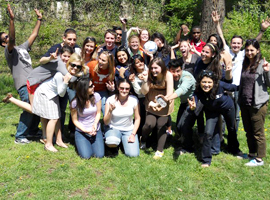J. Amber Ahmed (BA ’07) remembers her Archer Center Fellowship in Washington, D.C., as if it were yesterday. “I would wake up in a house bursting with energy, and navigate getting ready for work with 15 roommates, then take the Metro to the office for an entirely unpredictable day,” Ahmed said. “Some days I would head to the Hill for a hearing, during others I would research grants in the office.”
“As an Archer, you get to be a fly on the walls that house national and international decision-making.”
J. Amber Ahmed,
2007 Archer Fellow
Ahmed interned for The University of Texas System Office of Federal Relations as part of the fall 2007 Bill Archer Fellowship cohort. She coordinated congressional support of educational and health grants for UT System institutions by attending and analyzing congressional hearings, briefings and conferences dealing with education, science and energy issues.
“I could be in a meeting with the Secretary of Education, at a Congressional Black Caucus luncheon, or organizing a conference with the Department of Defense,” she recalled. “I think the Archer fellowship added a unique experiential element to my academic career. As an Archer, you get to be a fly on the walls that house national and international decision-making.”
Ahmed translated her Archer Fellowship into work on Capitol Hill before attending UT Austin, where she plans to graduate with a law degree and a master’s in communication studies in May 2012.
More than 400 students have participated in the Archer Fellowship Program, which this year celebrated its 10th anniversary. On March 5, more than 400 people, including 150 alumni of the program, attended a Washington event to mark the occasion.

Students from a variety of UT System schools participating in the Archer program attended a picnic this spring.
“The celebration was an incredible milestone for The Archer Center,” Director Katie Cook Romano said. “Looking around the room at 10 years of Archer Center history represented by Archer Fellow alumni, current Fellows and hundreds of supporters of our mission, it was remarkable to see how Congressman Archer’s vision has flourished and impacted the lives of so many people.”
Established by former U.S. Rep. Bill Archer and The University of Texas System, the program provides semester-long internships in Washington for accomplished upper-division students at UT institutions. Participants are placed in internships that immerse them in an exchange of government and political ideas.
“Looking around the room at 10 years of Archer Center history represented by Archer Fellow alumni, current Fellows and hundreds of supporters of our mission, it was remarkable to see how Congressman Archer’s vision has flourished and impacted the lives of so many people.”
Katie Cook Romano,
Archer Center Director
Besides federal agency internships, students intern in such locations as the United Nations Information Centre, the U.S. Department of State and the White House and on Capitol Hill, to name a few.
Students are expected to take a full load of classes – with a heavy emphasis on policy, advocacy and politics – as they participate in the full-time internships. The 32 undergraduates live in UT System housing one block from the Supreme Court.
The undergraduate program began as a collaborative effort between UT Austin and the UT System Office of Federal Relations in Washington, D.C., with the simple purpose of introducing the best and brightest undergraduate students from Texas to the federal process. It eventually grew to include all UT System campuses.
Besides the Archer Fellowship Program, which is limited to undergraduates, the Archer Center now offers the Summer Graduate Internship Program in Public Policy for master’s, PhD and other graduate students from across the UT System. The program, which accepts 16 graduate students for the summer, runs from Memorial Day through mid-August.
Dr. Donald Arbuckle, clinical professor with the School of Economic, Political and Policy Sciences used his decades of experience working in the White House’s Office of Management and Budget to help develop and conduct the first graduate internship program in summer 2010.

Lindsay Bernsen does the UT Dallas "Whoosh" in front of the Library of Congress.
“This program is not directed solely at government, political science or public policy students,” Arbuckle said. “You do not have to be an expert in how the federal government is organized or works. This Archer Center program is aimed at graduate students from all fields who are interested in how their graduate study is affected by the federal government’s raucous policy-making process.”
In 2007, UT Dallas became the Archer Center’s administrative home. Dr. Edward Harpham, associate provost and director of the University’s Collegium V honors program, serves as primary faculty liaison to the Center and is a member of its advisory board. In the past decade, dozens of his political science and honors students successfully have competed for Archer Fellowships.
“It’s wonderful to share your victories and challenges with a supportive group of talented, civically involved friends. Loyalty among Archers transcends political or professional boundaries.”
J. Amber Ahmed
“UT Dallas has so many bright, talented students who have a passion for politics and the law,” Harpham said. “Our ability to give them this experience is something they can’t find widely outside the UT System.”
Aside from career exploration and a look at Beltway activity from the inside, Archer Fellows say they form a bond that lasts beyond the cohorts’ Washington internships.
“I still see Fellows in my classes frequently in Austin,” Ahmed said. “It’s wonderful to share your victories and challenges with a supportive group of talented, civically involved friends. Loyalty among Archers transcends political or professional boundaries.”
Archer Fellows are selected each spring for the following academic year. For more information on how to apply for the Archer Center undergraduate internship program, see the application process web page or contact Dr. Harpham, the UT Dallas campus liaison.